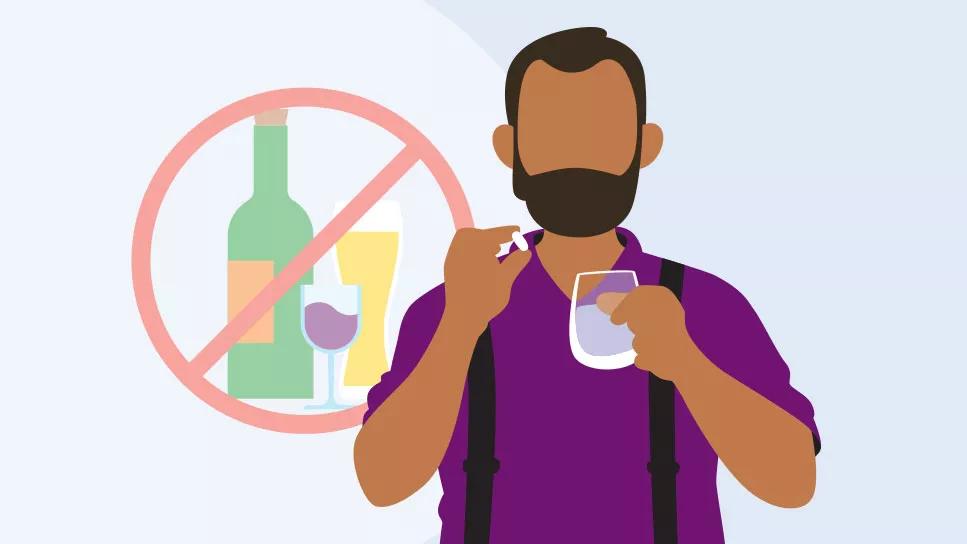Even a little alcohol can slow your recovery, so it’s best to wait until after you finish your antibiotics before imbibing

Image content: This image is available to view online.
View image online (https://assets.clevelandclinic.org/transform/073e8563-efda-4dbe-b324-5e242ec0bff6/no-alcohol-antibiotics-1670739541)
Male holding pill and glass of water, with assorted alcohol behind him crossed out
Thank goodness for modern medicine! Just a few days of antibiotics can wipe out uncomfortable or painful illnesses or infections. And these drugs generally have few (or mild) side effects.
Advertisement
Cleveland Clinic is a non-profit academic medical center. Advertising on our site helps support our mission. We do not endorse non-Cleveland Clinic products or services. Policy
You may feel like you can go about your day as normal. But if your day includes unwinding with a beer or glass of wine … you’ll probably have to put that on hold while you take your medication.
“‘Can I drink alcohol when taking antibiotics?’ is a question I get several times a day,” says primary care provider Colleen Clayton, MD.
While the answer isn’t cut and dry, she advises against it.
Moderate alcohol consumption doesn’t usually reduce antibiotic effectiveness or cause serious interactions (although, there are a few exceptions). But alcohol can reduce your energy and delay recovery, so it’s best to avoid alcohol while on antibiotics.
Dr. Clayton explains what you need to know.
Alcohol can have many negative effects on your health, including on liver function, digestion and heart health. Frequent alcohol use can also weaken your immune system, making it easier to pick up contagious illnesses.
And if you’re already sick, alcohol can delay how fast you recover from illness.
“Dehydration and poor sleep are the main side effects of alcohol that can slow your recovery,” clarifies Dr. Clayton.
Healthcare providers write over 200 million antibiotic prescriptions every year, according to the U.S. Centers for Disease Control and Prevention (CDC). That’s 6 prescriptions for every 10 people. And they prescribe a wide range of antibiotics. While these medications aren’t appropriate for every illness, they’re effective for treating certain infections.
Advertisement
Most antibiotics don’t interact with alcohol, but there are two major exceptions:
Avoid alcohol completely when taking metronidazole or tinidazole, states Dr. Clayton. Combining them can cause extreme:
Similar but less severe symptoms can also occur with Bactrim®, a sulfa antibiotic that contains sulfamethoxazole and trimethoprim. Providers use Bactrim for many types of infections, including urinary tract infections, diarrhea and pneumonia.
If you’re taking metronidazole or tinidazole, one drink is not safe. Stay away from all alcohol — even the small amounts found in some mouthwashes and cold medicines.
For other antibiotics, hold off until you’re feeling better. “If you’re fighting an illness that requires an antibiotic, be kind to your body and let it heal,” advises Dr. Clayton. “But if you’re improving and near the end of your prescription, a glass of wine with dinner is probably fine.”
There’s no waiting period to drink alcohol after taking most antibiotics. But for metronidazole or tinidazole, Dr. Clayton recommends waiting at least 72 hours after your last dose before consuming any alcohol.
You may have read online that alcohol reduces the effectiveness of some antibiotics. If you’re healthy, moderate alcohol use shouldn’t affect how well an antibiotic works, notes Dr. Clayton.
What if you have an important event — like a bachelorette party or high school reunion — where you may want to have a drink? In most cases, Dr. Clayton says you should get nonalcoholic beverages instead (mocktails, anyone?), as you shouldn’t put off starting your antibiotic.
“But something like bacterial vaginosis, which I commonly treat with metronidazole, isn’t urgent,” he adds. “I tell patients they can start their antibiotic after the weekend if their symptoms aren’t too bothersome.”
Every prescription comes with a package insert that includes instructions for use and precautions. A 2020 study found the alcohol warnings for antibiotics on these inserts aren’t always the same.
One problem is there’s little scientific evidence regarding alcohol use with antibiotics. The recommendations are open to interpretation (often based on personal experience, observation and general knowledge of how alcohol and antibiotics act in the body).
“That’s why it’s always a good idea to talk to your provider about whether alcohol use is OK when taking antibiotics,” says Dr. Clayton. “They know you best and can help you understand the risks and what they mean for you.”
Advertisement
Advertisement

Sign up for our Health Essentials emails for expert guidance on nutrition, fitness, sleep, skin care and more.
Learn more about our editorial process.
Advertisement
This antibiotic can cause tooth staining that doesn’t fade on its own — but you still have options for whitening your smile
How science is fighting superbugs
Don’t assume you need them when you’re sick
Tips on probiotics and food choices
The little blue pill might help with physical arousal, but there are better treatments for low libido in women
Most antihistamines, like Zyrtec, are OK, but avoid decongestants for at least the first trimester
This diabetes medication can treat obesity, but it’s not for people who just want to drop a few pounds
Weight loss may cause loose, sagging skin and muscle loss to your rear
Prioritize your health by managing stress, strengthening your social connections and getting quality sleep
Bolsters, blankets, pillows and blocks can offer extra support, stability and comfort
Allergies, postnasal drip, asthma or reflux could be to blame for a cough that won’t quit